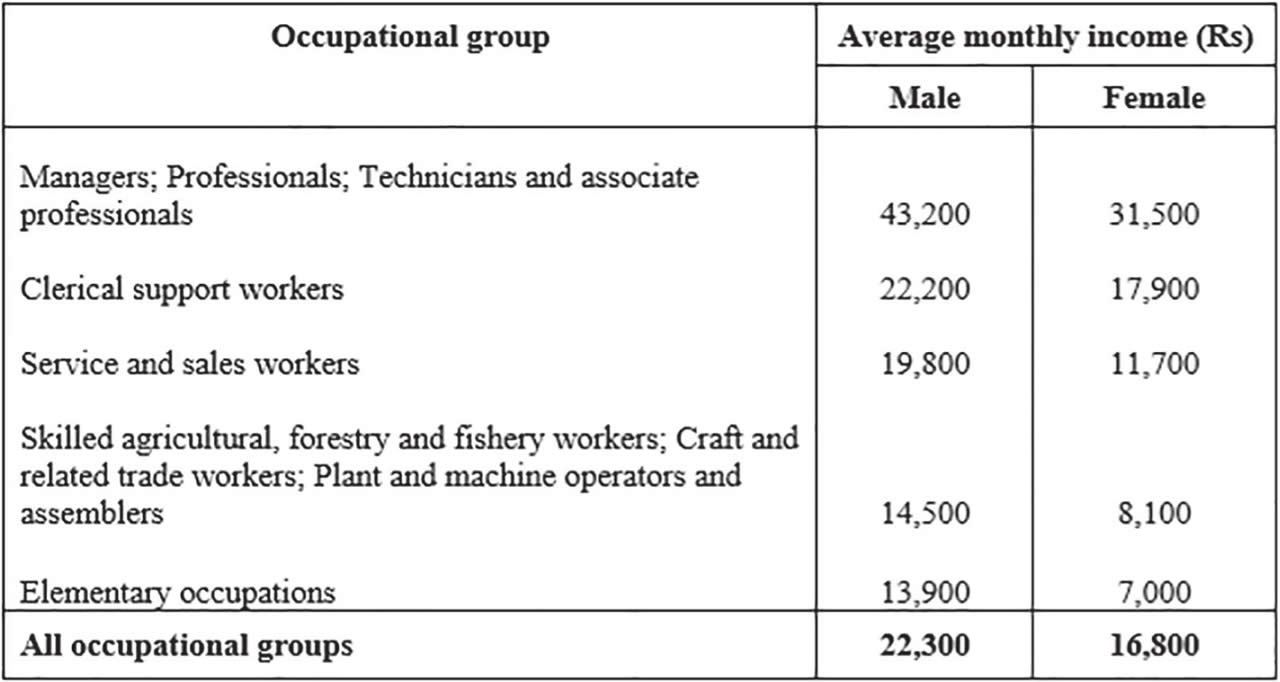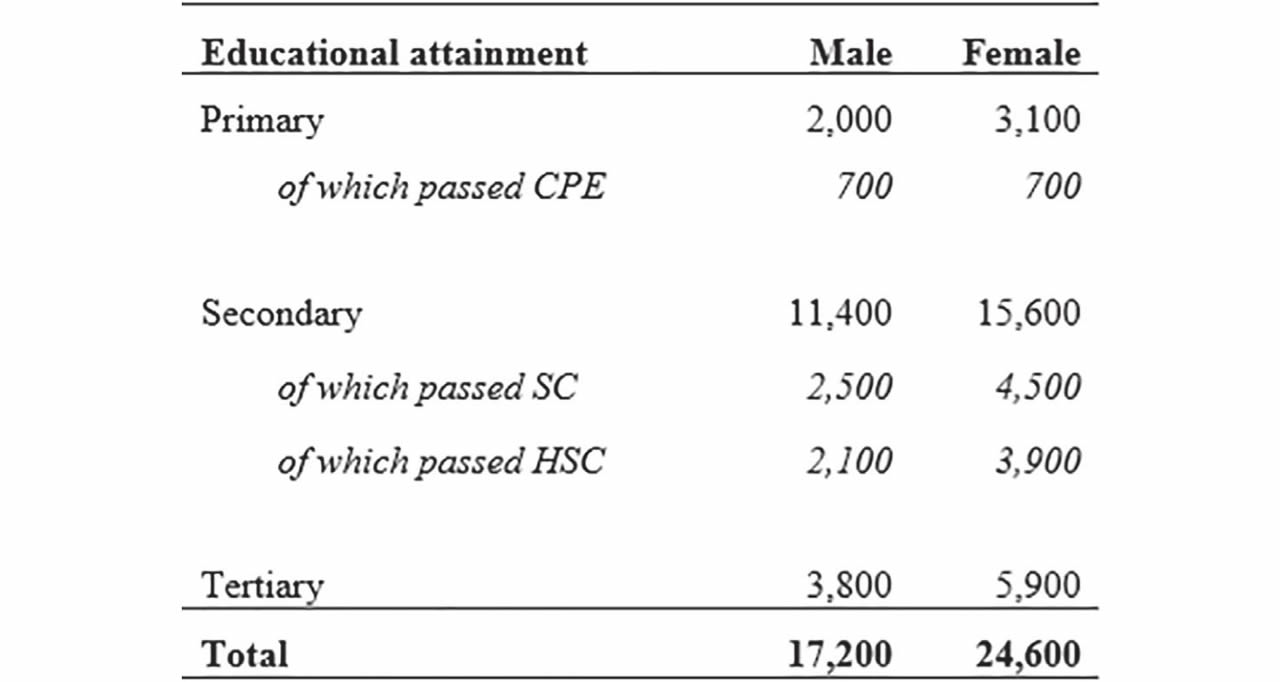International Women’s Day - Employment and Salary Disparity : Critical Inequalities Still Widespread
 Par
Nafissah Fakun
Par
Nafissah Fakun
 Par
Nafissah Fakun
Par
Nafissah Fakun

This Friday 8th March marks the International Women’s Day, which will be celebrated under the theme ‘Balance for Better’. In Mauritius, we hear a lot about women empowerment and emancipation but disparity between men and women still persists in the job sector. According to statistics, in spite of being fewer in the labour force (representing only 39%), women were over represented among the unemployed. In addition, women’s average income tends to be lower than men. News on Sunday speaks to some stakeholders to analyse this pay discrimination and why women are denied employment opportunities.
Forging a more gender-balanced world is the call-to-action of this year’s theme of the International Women’s Day. From the right to vote, having a bank account, access to education, to the right to work, women’s roles and positions in societies around the world have greatly evolved. Women have definitely come a long way, however, there is still more to be achieved. In fact, in what we call our developed 21st century world, women are still facing inequality barriers when it comes to labour force participation and wages.

Source: Statistics Mauritius
Though far more Mauritian women have jobs than decades ago, statistics, nevertheless, show that the female participation in the workforce remains low. The latest Gender Statistics 2017 indicates that despite women representing a low proportion of the working population namely 39% only, they are the ones who suffer more from unemployment. According to the statistics, 24,600 women compared to 17,200 men in 2017 were unemployed, thus representing nearly 59% of the total unemployed. Female unemployment also rates stood at 10.7%, much higher than the rate for male.
Moreover, data also shows that the unemployed women are “generally more qualified than their male counterparts.” Around 8,400 of them possessed the School Certificate (S.C) or Higher School Certificate (HSC) against 4,600 males. More surprisingly around 5,900, that is 24.0% of unemployed Mauritian women attained tertiary level education as compared to 3,800 unemployed men, representing only 22.1%.
When it comes to wage, Mauritian women unfortunately are still subject to discriminatory pay. The Gender Statistics 2017 underlines that “across all occupational groups, women on average earned less than men. In the occupational category of managers, professionals and associate professionals, women earned on average 73% of what men earned. In elementary occupations, women earned around half of what men earned.”

Source: Statistics Mauritius
Trade unionist Jane Ragoo says that we have to differentiate between the blue collar and white collar jobs. “For a blue collar job, mainly manual and operational, women are still being recruited and they accept whatever job they are given. The salary is low while the working hours are long. Prominent examples are the Export Processing Zone sector (textile and garment) and the sea food hub (tuna).”
For the blue collar jobs, she trusts that “since the last five years, local workers are being replaced by migrant workers, because they agree to work long hours and with low wages. They are mostly women in those particular sectors.”
Regarding white collar jobs, Jane Ragoo utters that “even though women are more qualified, they think twice before accepting more responsibilities. Being in a patriarchal society and having been raised up in an environment making us believe that family responsibility is ours, sometimes it is very difficult for some women to accept staying at the office after normal hours work or continue to work at home.”

When it comes to salary, the trade unionist underlines that “in the public sector, the existing structure for conditions of work and salary grading is the Pay Research Bureau (PRB). Both men and women are protected.” However, regarding the private sector, she explains that, “the 30 existing Remuneration Orders under the aegis of the National Remuneration Board (NRB) prescribes conditions of work and salary for mostly the lower grades. This situation leaves while collar jobs employee at the whims and discretion of the employers’ decision.”
She adds that “as is the case with the PRB, all sectors and categories of job in the private should be covered by a Remuneration Order to ascertain that the decision does not rest on the employer to decide on salaries, thus women would be better protected.”
Is there a long way to go to achieve gender equality in Mauritius? “Much progress have been made but there is still room for improvement. We need to change our mind-set, starting right from home. All of us need to understand that as long as women empowerment is hindered, progress in society will be hampered,” declares Jane Ragoo.
 The Human Resource Professional states that “unfortunately in Mauritius, there is still the perception from executive committees, mostly composed of men, that women will not be able to handle some positions, especially if there is a lot of pressure and odd hours involved, if the women are newly married or if they have children.” Commenting on the statistics which indicate that average income for women is lower than men, Jessyca Joyekurun-Toocaram utters that “there is still the concept of glass ceiling across all levels, which is observed in terms of salaries as well when it comes to recognising the market value of women. This could be explained by women getting penalised for their child bearing years, among others.”
The Human Resource Professional states that “unfortunately in Mauritius, there is still the perception from executive committees, mostly composed of men, that women will not be able to handle some positions, especially if there is a lot of pressure and odd hours involved, if the women are newly married or if they have children.” Commenting on the statistics which indicate that average income for women is lower than men, Jessyca Joyekurun-Toocaram utters that “there is still the concept of glass ceiling across all levels, which is observed in terms of salaries as well when it comes to recognising the market value of women. This could be explained by women getting penalised for their child bearing years, among others.”
The HR Professional adds that it could also be due that “instead of valuing working smartly, management teams tend to reward and view better male employees who can afford to stay more after office hours. Hence, male employees could be promoted more or even get more increments.”
Is this disparity legal? “In the Employment Rights Act and provisions of the Equal Opportunity Act, there is also a section with regards to equal pay. Nevertheless, it will be very difficult for a woman to prove unfairness as the employer could use several subjective reasons to justify disparity for same position,” she adds.
She trusts that “There is also the patriarchal mentality that women are the weaker sex and can only perform in junior roles having less pressure.”
The HR Professional trusts that gender equality and equity is at a stage of myth. “There is much work to be done from parents at home and in schools when raising children in a ‘gender fluid’ manner. In the workplace, the senior management and human resources team should flag and sanction where they see discriminatory behaviours and having a zero tolerance policy, etc.”
 For the member of Lalit Party, the dismissal in the sugar and manufacturing sector has mostly affected women employees. “Between fifteen and twenty thousand workers in the sugar industry have been dismissed, the number having gone from 5,000 to around 1,500. In addition, in the manufacturing and textile sector, 200,000 employees, mostly females, have been sacked. These are one of the major reasons why women in Mauritius are the most affected by unemployment,” argues Lindsey Collen.
For the member of Lalit Party, the dismissal in the sugar and manufacturing sector has mostly affected women employees. “Between fifteen and twenty thousand workers in the sugar industry have been dismissed, the number having gone from 5,000 to around 1,500. In addition, in the manufacturing and textile sector, 200,000 employees, mostly females, have been sacked. These are one of the major reasons why women in Mauritius are the most affected by unemployment,” argues Lindsey Collen.
She trusts that this is due to the irresponsibility of both employers and Government. “The Government has encouraged the employers in these sectors to invest in IRS (Integrated Resort Scheme) projects and provided them with incentives while on the other hand, there are few job opportunities in the IRS.” Lindsey Collen states that job creation is vital in order to address the gender gap in the job sector. “If women have a job, this means financial independence for a good home.”
Regarding the salary disparity, Lindsey Collen utters that the state should subsidise the working mass and not the big capitalists. “Employees need to increase their share of the fruits of production because employers have become richer while employees have gone poorer.” She trusts that the Government should have promoted the productive industry so that this would have created employment for both genders. “Many women need to juggle among three to four jobs due to inequalities on salary.”
 Partner and director of CQTech, a security company, Trainer & Coach for Dale Carnegie, member of AMFCE, Women in Networking Shabnam Esmael states that disparity and equality should not have been a battle and if it is one today, it should not be that of women only but an equilibrium that we need to reach together as a nation.
Partner and director of CQTech, a security company, Trainer & Coach for Dale Carnegie, member of AMFCE, Women in Networking Shabnam Esmael states that disparity and equality should not have been a battle and if it is one today, it should not be that of women only but an equilibrium that we need to reach together as a nation.
As a director, she has been recruiting people and she has based herself solely on criteria like skills, knowledge and attitude but not gender. “While recruiting people, skills and qualifications and attitude are more important than being a woman or man. If today, there is the issue of inequality, it is because of our roots and past, going back to the Stone Age. We have evolved but not our state of mind. Gender equality is far from being a reality and we have a long way to go.”
She affirms that the Government should initiate the right environment and provide the necessary support. “It is high time to support the differences. Women need not to be same as men but they should be considered as complementary and there is a need to respect that. Stereotypes related to ‘male’ and ‘female’ jobs have to stop.”
 The Managing Director at SmarTree Consulting Ltd and fellow member of the Mauritius Institute of Directors (MIoD) trust that the gender gap in the labour market is real in the country. “Mauritius has been constantly one of the lowest performing countries in the region on female labour force participation, on the gender pay gap, and on female representation at decision making spheres. This indicates that there is a need for a government policy and/ or legislation to promote gender diversity, a corporate culture with a comprehensive ecosystem that drives women’s confidence in success, and an overall patriarchal society that supports women’s ambitions and growth.”
The Managing Director at SmarTree Consulting Ltd and fellow member of the Mauritius Institute of Directors (MIoD) trust that the gender gap in the labour market is real in the country. “Mauritius has been constantly one of the lowest performing countries in the region on female labour force participation, on the gender pay gap, and on female representation at decision making spheres. This indicates that there is a need for a government policy and/ or legislation to promote gender diversity, a corporate culture with a comprehensive ecosystem that drives women’s confidence in success, and an overall patriarchal society that supports women’s ambitions and growth.”
According to her, “the big debate in this space isn’t whether a gender wage gap exists — it’s why the gap exists. Some think the wage gap is the result of gender discrimination, an economy that doesn’t believe women can perform as well as men. Others point to women selecting into certain fields that pay less — while still others cite gaps in the types of education men and women pursue.”
Sheila Ujoodha trusts that growth strategies should be introduced in order to promote much greater gender equality when it comes to rewarding jobs and top posts. “It’s critical that companies focus on closing gender disparities early in the pipeline. This will improve the representation of women all the way to the top. Companies should adopt a solution oriented and tailor-made approach that encourage work life balance of its employees.”
She is of the opinion that gender equality is far from being achieved in Mauritius. “This is unfortunately a reality not only in Mauritius but in other countries as well. We are missing out on 50% of the potential productivity and output, and on 50% of the skills and knowledge available to us,” argues Sheila Ujoodha.
 Yashmee Dewoo, the Country Human Resource Lead at Accenture trusts that there is also the culture factor which contributes to the inequality. “There are some jobs that are still considered ‘men’s jobs’ and women, although perfectly capable, are not accepted in them. However, during the last 20 years, we can see that things have changed, we see women working in areas that were previously for men, like in the construction or transport sector.”
Yashmee Dewoo, the Country Human Resource Lead at Accenture trusts that there is also the culture factor which contributes to the inequality. “There are some jobs that are still considered ‘men’s jobs’ and women, although perfectly capable, are not accepted in them. However, during the last 20 years, we can see that things have changed, we see women working in areas that were previously for men, like in the construction or transport sector.”
For her, the stigma around working mothers needs to be changed. “Women often create the blocking ceiling themselves. They think that by going on maternity leave or taking time out to be with their children will hinder their career growth. They need to break the inner barriers to flourish.” She trusts that the salary disparity could be explained “by the fact that women do not speak up. They accept a salary without negotiating, it is certainly not the case for men!”
 J'aime
J'aime